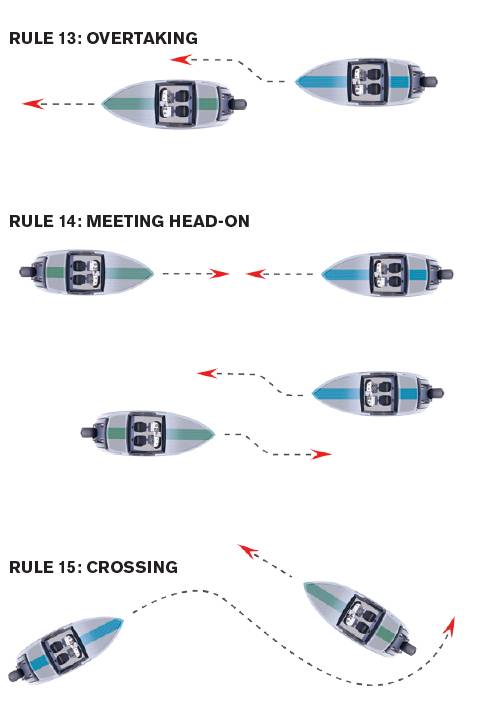The sky was clear and visibility was good for take-off on this October morning on Lake Barkley.
Taking off from one tournament and heading up the lake along the red buoy line was a bass boat operated by Tommy Hunt of Lewisport, Ky., while another bass boat driven by David Young of Mayfield, Ky., was traveling downlake, also along the red buoy line after taking off from a different tournament. According to the Kentucky Fish and Wildlife Resources accident report, Young stated that he observed Hunt’s boat coming toward them and he altered his course, attempting to avoid a head-on collision. Young said he decelerated to the point that his boat exited plane when he realized the boats were still on a collision course.
Hunt stated that Young’s boat kept coming at a high rate of speed and, when he realized the boats were going to hit head-on, he turned to the right and accelerated to avoid a collision. At this point, the bow of Hunt’s boat struck the port side of the middle of Young’s boat and penetrated the hull of the boat at the passenger seat, striking passenger Freddy McCrory of Eupora, Miss., in the left abdomen and ejecting him from the boat. McCrory died from the multiple blunt force injuries he sustained in the collision.
Although no violations were cited in the accident report, the reporting officer found that Hunt did not stay to the right of the oncoming Young, and that Young did not stay to the right of mid-channel.
Accidents such as this one involving tournament boats are a rarity due to the safety requirements of tournaments. “The bass boat guys are the ones who wear the kill switches and have to wear the life jackets,” says Joe Hughes, a Missouri State Highway Patrol Water Patrolman and member of the B.A.S.S. Eldon Bass Club. “They drive pretty fast, but overall they are safe boaters.”
Knowing the “Rules of the Road,” officially named by the U.S. Coast Guard as the Inland and International Navigation Rules, also helps bass anglers become safer boaters. Coast Guard Lt. Colin Fogarty lists the following rules (see illustrations) as the most common situations bass anglers will encounter.
- RULE 13, OVERTAKING: “If you are approaching another vessel from its stern while you are overtaking it, it is your duty not to impede the movement of that boat. You need to stay out of its way,” says Fogarty, who suggests staying to the right of the boat you are overtaking, if possible.
- RULE 14, HEAD-ON: “Each vessel is supposed to turn to starboard and leave the other boat on its port side,” says Fogarty.
- RULE 15, CROSSING: When two boats are crossing, the vessel that has the other on its starboard side shall stay out of the way and avoid crossing ahead of the other vessel.
Hughes notices bass anglers tend to neglect two other navigation rules (maintaining a proper lookout and proceeding at a safe speed for the prevailing conditions) that lead to accidents. “It is not so much weather conditions as much as it is from boat traffic with the waves from other boats,” Hughes says. “Those waves are hard to see and they are travelling too fast for them.
“The bottom line is, if you know the navigation rules or not, it is your responsibility to take whatever action to avoid an accident,” Hughes says. “When it comes to the rules of the road, you may know them but the other boater may not. If you have to make a turn the incorrect way based on the rules of the road, or if it means coming to a complete stop or whatever to avoid that accident, that is what you need to do.”
Taking drastic action can prevent an accident sometimes, but it can also lead to disaster. “That is where trouble occurs is when one vessel doesn’t think the other is taking enough action and then they try certain actions to avoid it and at that point it just confuses everyone,” Fogarty says. “If at any point you feel that something is going wrong, one of the better things you can do is just slow down. If you can slow down, that will hopefully give both parties more time to figure out what is going on and if there is still a chance of collision, the impact will be less.”
For more information on the Coast Guard’s navigation rules, click on the “Nav Rules” link at the top of their website, www.navcen.uscg.gov.
Brushing Up On Navigation Rules
Bassmaster Elite Series pro Brian Snowden learned more about boating safety and navigation rules when he became a Coast Guard-licensed guide.
“I think most tournament anglers are some of the safest boaters on the water,” he says. “Most of them are very experienced behind their boat and 95 percent of them will wear their life jacket even in practice.”
The Missouri pro recommends that bass anglers still brush up on the navigation rules by taking a boater safety test. “Some insurance companies will offer discounts if you pass a safe boaters course,” Snowden says.
Qualified volunteer organizations, such as the U.S. Coast Guard Auxiliary and U.S. Power Squadron, and many state boating agencies, provide boater safety classes.
Originally published in Bassmaster Magazine, June 2012





